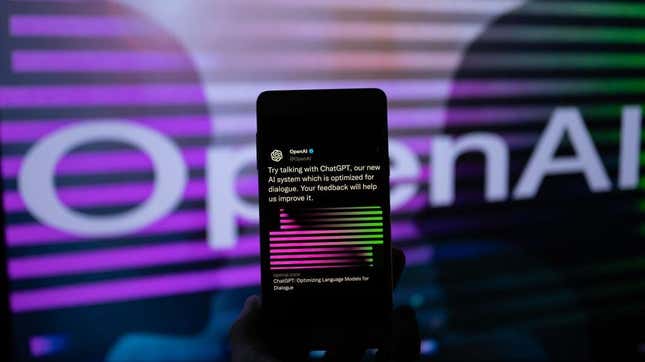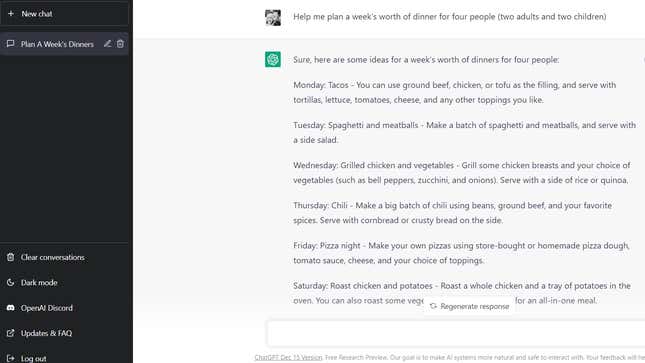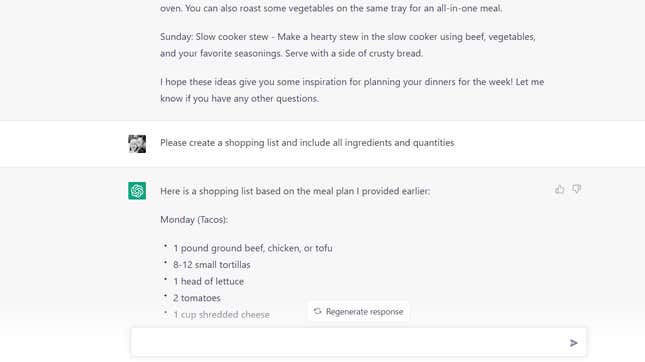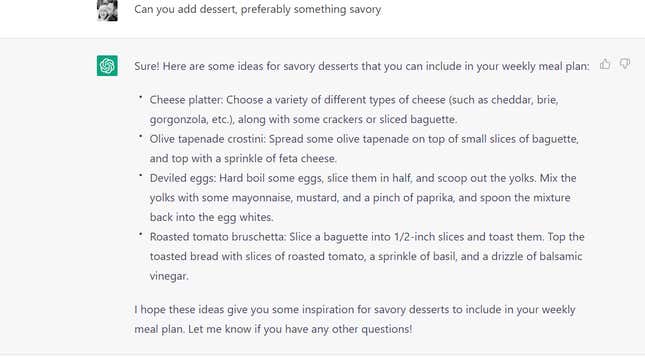
Remember last year when everyone on Twitter was posting AI-generated art based on the wackiest queries they could think of? Well, the developer of that program, OpenAI, recently released its long anticipated chatbot. And it might just help you with your cooking.
ChatGPT is an artificial intelligence tool that can respond to your questions in a conversational, highly human manner. To say that ChatGPT has been well-received in the weeks since its November 30 debut would be an understatement: In less than a week, the program gained one million users. The unprecedented response to the program has other large companies taking notice—even Microsoft is reportedly launching a ChatGPT-powered version of its Bing search engine in order to compete with Google.
As a working mother of two, I often run out of creative ideas for dinner, let alone lunch. I began to wonder: Can ChatGPT be my new personal assistant? To find out, I signed up for an account and spent an afternoon testing the program, to delightful results.
ChatGPT is all in the details
“Help me plan a week’s worth of dinner for four people (two adults and two children),” I asked ChatGPT. Within seconds, it generated exactly what I asked for: an entire week of meal ideas. From tacos on Monday to chili on Thursday, I was surprised by the variety of dishes it provided:

The suggestions weren’t recipes; they were more like general ideas to help me start thinking through my options. And they weren’t complex meals, either. This might mean that ChatGPT is able to infer that someone asking for help with a meal for four (including two children) probably doesn’t have a lot of free time on their hands. Or perhaps it is serving up suggestions based on the internet’s most popular recipe searches (which are likely most popular because busy parents seek them out for their simplicity and convenience). But whatever the case, the suggested meals were helpful.
Next, I asked for shopping list based on those meal ideas, and in less than 20 seconds, I had one in front of me, itemized by day and recipe. The recipes were also provided, all without me having to consult Google or rummage through my many cookbooks.

I ended up taking three out of the five dinner suggestions: spaghetti and meatballs, tacos, and roast chicken with potatoes. Better still, I asked ChatGPT the same question a second time—“Help me plan a week’s worth of dinner for four people (two adults and two children)”—and was delighted to find that it gave me a new set of responses, including vegetable stir fry, fish tacos, and slow cooker barbecue pork. I also asked for meals that take less than an hour to make, as well as Asian-inspired meals, and it responded with a simple chicken stir fry.
While Google’s search engine is a powerful tool for searching information online, its SEO and ad-driven results can often feel like digging through an enormous minefield before striking gold. ChatGPT’s simple interface and its quick, precise answers are what make this program so extraordinary. It’s not optimized for ads or clicks, at least not yet—it’s focused on providing an answer to the query, delivering on your request and nothing else.
ChatGPT has been criticized for its lack of personality, but for me, it was surprisingly pleasant and polite. ChatGPT ends every single answer with a polite attribution. “I hope this was helpful for you!” it said. “Let me know if you have any further questions.” I felt as if I was talking to a very knowledgeable friend.
AI’s line between good and evil
Elon Musk, one of the early supporters of OpenAI, tweeted three days after ChatGPT’s debut, “ChatGPT is scary good. We are not far from dangerously strong AI.” While the application may be a giant leap for mankind, it comes with its own ethical and moral quandaries.
Gary Marcus, professor emeritus of psychology and neural science at NYU, is skeptical of the chatbot. He believes that such systems, while highly intelligent, can be detrimental to the future of our society due to their non-human sensitivities.
“Because such systems contain literally no mechanisms for checking the truth of what they say, they can easily be automated to generate misinformation at unprecedented scale,” Marcus writes.
Fortune magazine writer Jeremy Kahn echoes a similar sentiment. “ChatGPT expresses both fact and fiction with equal confidence and style,” he writes.

Be careful what you wish for
To combat humanity’s potential downfall, Edward Tian, a computer science student at Princeton University, recently built GPTZero, an app to combat AI-based plagiarism. In a tweet thread on January 2, Tian demonstrated GPTZero’s effectiveness by comparing an article written by a human (in this case, New Yorker staff writer John McPhee) to one written by ChatGPT, measuring the perplexity of each excerpt to determine which one was AI-generated.
GPTZero is in its beginning stages, just like ChatGPT, but the hope is that as text-generating AI becomes more capable of imitating us, plagiarism-detecting AI becomes just as skilled at calling it out. And of course, of the many groups of people who could be affected by skilled AI programs, cookbook authors and recipe bloggers are among them, with ChatGPT recipes posing a potential a threat to their livelihood.
At the moment, ChatGPT is free to use, but that might not be the case for very long. It is certainly not clear of misinformation or bias, either. Notably, it has limited information about the world after 2021—this much is disclosed on its main user interface.
Furthermore, certain questions cannot be answered definitively using ChatGPT. Take, for example, when I asked the program how much the ingredients will cost. Its responses were vague: “Prices for ingredients can vary widely depending on your location, the time of year, and the specific stores you shop at,” it said. That’s certainly true, though it demonstrates the limitations of using this program as a personal assistant, at least on its own. It can’t tailor recipes to you unless you provide exact specifications, but depending on your needs, its current capabilities might be all you need.
Can ChatGPT find recipes and plan a holiday meal for you? Absolutely. Can it create a shopping list for said meal? Yes. Can it write a college term paper for you? Yes. But it’s well worth knowing what the service can and can’t do, and what your weekly menu stands to gain from seeking an alternative source.